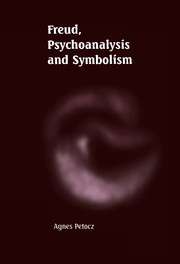Book contents
- Frontmatter
- Contents
- List of figures
- Preface
- Introduction
- Part One Exegesis and Extraction
- Part Two Consolidation and Defence
- 7 The problem of the ‘system unconscious’
- 8 The problem of language
- 9 Ernest Jones's contribution
- 10 The ‘Freudian Broad’ (FB) theory of symbolism
- 11 Symbolism: logical constraints and psychological requirements
- Epilogue
- List of references
- Index
9 - Ernest Jones's contribution
Published online by Cambridge University Press: 22 October 2009
- Frontmatter
- Contents
- List of figures
- Preface
- Introduction
- Part One Exegesis and Extraction
- Part Two Consolidation and Defence
- 7 The problem of the ‘system unconscious’
- 8 The problem of language
- 9 Ernest Jones's contribution
- 10 The ‘Freudian Broad’ (FB) theory of symbolism
- 11 Symbolism: logical constraints and psychological requirements
- Epilogue
- List of references
- Index
Summary
Jones's paper ‘The theory of symbolism’, published in 1916 during the core years of Freud's presentation of the FN theory, is, apart from Freud's own writings, the most substantial contribution to the psychoanalytic account of symbolism. Systematic and focused, it reveals a perceptive appreciation of the unity of Freud's material on symbolism. Yet its real value, which goes beyond this, has not yet been recognised. Rodrigué's (1956) assessment, that it is ‘the limitations of our basic theoretical assumptions on symbolism’ which explain why symbolism ‘has had a strange and disappointing fate’, and why so little ‘has been added since Jones wrote his comprehensive essay’ (p. 147), is as relevant today as it was forty years ago. Without the kind of extensive exegesis of Freud's writings on symbolism which has been offered in the first part of this book, without the thesis that a broad theory of symbolism is to be found in those writings, and without the revisions to Freud's material which are necessary to support that theory, the genuine contribution of Jones's paper remains hidden; instead, it is generally considered to be little more than a comprehensive summary of Freud's views. In the context of the present thesis, however, Jones can be seen to make two significant contributions.
- Type
- Chapter
- Information
- Freud, Psychoanalysis and Symbolism , pp. 198 - 214Publisher: Cambridge University PressPrint publication year: 1999



